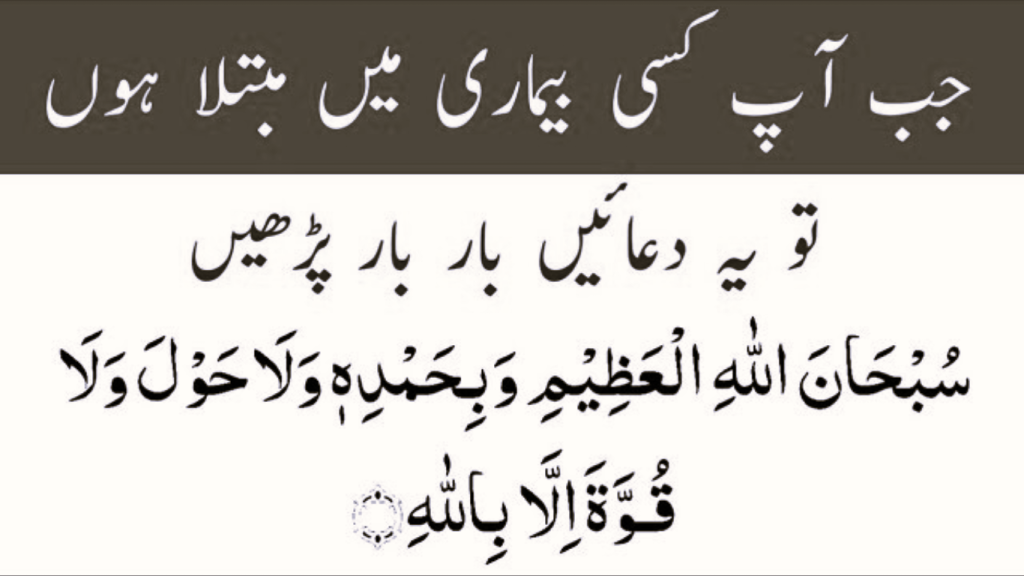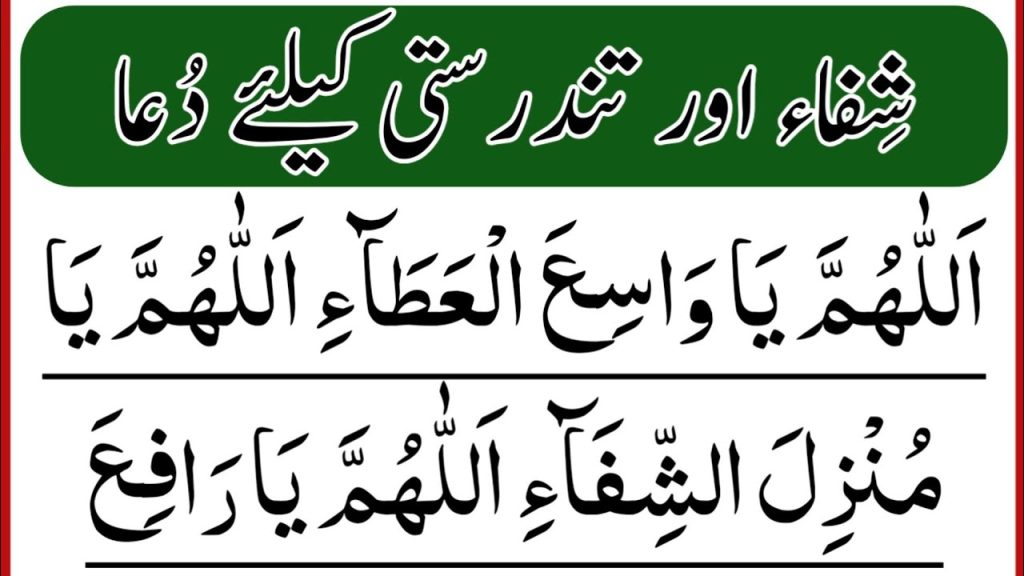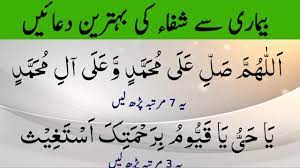Introduction: Bimari Sy Shifa Ki Dua in Quran – Rahmat Aur Ilm Ka Paigham
In our modern world, where stress, pollution, and sedentary lifestyles contribute to rising health issues, the spiritual dimension of Bimari Sy Shifa Ki Dua in Quran holds profound significance. Islamic tradition teaches that seeking healing (shifa) isn’t limited to medical treatment—it encompasses spiritual supplication and divine dependence. By combining Quranic verses and prophetic supplications, believers access a holistic path to recovery rooted in faith, hope, and divine mercy.
Quran as Ultimate Healing
The Quran itself is described as a source of healing (shifa) for hearts and bodies. Key verses underscore this transformative role:
- “We send down in the Quran that which is healing and mercy for the believers…” (17:82)
- “O mankind! There has come to you a healing for what is in the hearts…” (10:57)
These ayat emphasize that Allah’s revelation is not merely spiritual guidance, but a balm for emotional and physical affliction alike. As such, the phrase Bimari Sy Shifa Ki Dua in Quran isn’t just another keyword—it represents ancient wisdom meeting present-day needs.
Sunnah Duas Complement Quranic Healing
The Prophet Muhammad ﷺ exemplified seeking both divine and medical aid. Among the most powerful dua for shifa is:
“Allahumma Rabban‑naas, adh‑hibil‑ba’sa, washfi, anta‑sh‑Shafi, la shifa’a illa shifa’uka…”
“O Allah, Lord of mankind, remove the harm and heal, for You are the Healer; there is no cure except Your cure…”
This supplication, found in both Al-Bukhari and Muslim, reinforces spiritual reliance and invites believers to petition Allah directly for their health and comfort.
Prophet-Inspired Practices for Healing
Several prophetic traditions highlight practical spiritual remedies that reinforce Bimari Sy Shifa Ki Dua in Quran:
- Recitation of Surah Al-Fatihah, revered as both guidance and cure (ruqyah)—documented in Abu Dawud and At-Tirmidhi—supports both physical and spiritual healing .
- The “three Quls” (Ikhlas, Falaq, Nas) feature in daily dhikr and were personally used by the Prophet ﷺ during illness .
- Placing a hand over the painful area, reciting Bismillah three times, followed by A’udhu bi’izzati… seven times—a Sunnah advice recorded in Sahih Muslim—demonstrates spiritual mindfulness and physical comfort .
Integrating Shifa Duas in Daily Life
Embracing Bimari Sy Shifa Ki Dua in Quran isn’t limited to moments of crisis—it can be woven into daily routines:
- Regular recitation of Quranic verses of healing (Ayat ash-Shifa), including 17:82, 10:57, 26:80, and 41:44, aligns spiritual focus with health intentions.
- Pairing spiritual practices like dua and ruqyah with medical treatment respects both prophetic tradition and modern theology—as Islam values asbab (means) while affirming that ultimate healing is from Allah.
Why This Matters in 2025
Amid global health challenges—be it post-pandemic anxiety or chronic conditions—turning to Bimari Sy Shifa Ki Dua in Quran offers more than a momentary cure: it provides connection, hope, and inner resilience. Whether you’re battling illness or caring for loved ones, this spiritual approach reminds us that Allah’s words and prophecies nourish both body and soul.
In the following sections, we’ll explore specific Ayat ash‑Shifa, Sunnah duas, practical application, and contemporary relevance—guiding readers toward a faith-infused healing journey. Let’s embark together on this path of divine remedy and spiritual wellness.

In Islam, what does “bimari sy Shifa ki dua” mean?
Describe Shifa in Arabic as “healing,” “cure,” or “recovery.”
Islam views spiritual and emotional healing in addition to physical healing.
Allah alone is able to heal (call him “Ash-Shafi” – The Healer).
Significance of Reciting shifa ki dua
- You can emphasize that turning to Allah in illness increases faith and tawakkul (trust).
- Include that Prophet Muhammad ﷺ also performed shifa ki duas for himself and others.
- Dua is not a substitute for medication — we are told to do both treatment and prayer.
Use “bimari sy shifa ki dua” once naturally here.
Strong bimari sy Shifa Ki Dua from the Quran
Employ a table for clarity:
| Quranic Dua | Surah/Reference | Meaning |
|---|---|---|
| وَإِذَا مَرِضْتُ فَهُوَ يَشْفِينِ | Surah Ash-Shu’ara (26:80) | “And when I am sick, it is He who heals me.” |
| قُلْ هُوَ لِلَّذِينَ آمَنُوا هُدًى وَشِفَاءٌ | Surah Fussilat (41:44) | “Say: It is for those who believe a guidance and a healing.” |
| وَنُنَزِّلُ مِنَ الْقُرْآنِ مَا هُوَ شِفَاءٌ وَرَحْمَةٌ | Surah Al-Isra (17:82) | “We send down in the Qur’an that which is a healing and a mercy to those who believe.”. |
- Describe each dua briefly.
- Describe how each ayah heals spiritually and physically.
Recite “shifa ki dua” twice naturally while describing duas.
How to Recite Shifa Ki Dua

- Intention (Niyyah) is counted: praying to Allah with complete trust.
- Can be recited by you or on behalf of someone else.
- Utilize dua with medication whenever it is possible.
- Recite dua in all sincerity, humbly, and patiently.
Use “shifa ki dua” only naturally once.
Other Sunnah bimari sy Shifa Ki Dua
- Read Prophetic duas for healing (e.g. “Allahumma rabban-naas, adhhibil-ba’s.”).
- Quick examples from authentic ahadith.
- Short, easy to memorize.
Add “bimari sy shifa ki dua” once naturally here.
Prayers for the Ailing:
When visiting the sick: The Prophet ﷺ would reassure them that any discomfort or illness they experience in this world is a means for Allah to cleanse their sins from them. He would say:
لاَ بَأْسَ طَهُورٌ إِنْ شَاءَ الله
No harm, pure, God willing. Rather it is a form of purification, if Allah wills.
Upon visiting the ailing:
The Prophet ﷺ also related: “He who goes to see a sick person, not at the door of death, and says seven times:
أَسْأَلُ اللَّهَ الْعَظِيمَ رَبَّ الْعَرْشِ الْعَظِيمِ أَنْ يَشْفِيْكَ
I ask Allah, the Great, the Lord of the Mighty Throne, to heal you,” Allah will restore the health of that person.”
This hadith has been narrated in another version as:
In another narration, the Prophet ﷺ said, “If any of you or your brother is afflicted with an illness, then let him say:
رَبَّنَا اللَّهُ الَّذِي فِي السَّمَاءِ تَقَدَّسَ اسْمُكَ أَمْرُكَ فِي السَّمَاءِ وَالْأَرْضِ كَمَا رَحْمَتُكَ فِي السَّمَاءِ فَاجْعَلْ رَحْمَتَكَ فِي الْأَرْضِ اغْفِرْ لَنَا حُوبَنَا وَخَطَايَانَا أَنْتَ رَبُّ الطَّيِّبِينَ أَنْزِلْ رَحْمَةً مِنْ رَحْمَتِكَ وَشِفَاءً مِنْ شِفَائِكَ عَلَى هَذَا الْوَجَعِ فَيَبْرَأُ
“Our Lord, Allah, who is in the heavens, hallowed be Your name. Your command prevails in the heavens and the earth, just as Your mercy extends in the heavens, let it manifest on the earth. Forgive our sins and shortcomings; You are the Lord of the righteous. Shower upon us Your mercy and send healing from Your remedy upon this ailment, so that it may be cured.”
Supplications for Healing in the Sunnah:
Supplication for Discomfort: Ayesha (r) narrated that when any of his companions experienced an ailment, the Prophet ﷺ would massage the affected area and say:
أَذْهِبِ الْبَأْسَ رَبَّ النَّاسِ وَاشْفِ أَنْتَ الشَّافِي لَا شِفَاءَ إِلَّا شِفَاؤُكَ شِفَاءٌ لَا يُغَادِرُ سَقَمَاً
Soothe the hardship, O Lord of creation. Cure, You are the All-curing. There is no remedy other than Your remedy, a cure leaving no trace of ailment.
Dua for Sickness
Dua upon falling ill: The Prophet ﷺ also recommended that the ailing individual press his hand on the afflicted area, say “bismillah” three times, then recite the following seven times:
“I seek refuge with Allah and His Power from the harm I feel and the harm I fear.”
The supplication of Ayub (as) when he was sick:
رَبِّي أَنِّي مَسَّنِيَ الضُّرُّ وَأَنْتَ أَرْحَمُ الرَّاحِمِينَ
“Rabbi annee massaniyad-durru wa-anta arhamur-raahimeen”
My Lord, indeed adversity has touched me, and You are the Most Merciful of the merciful.
Dua for Goodness
This is one of the most unique supplications in Islam, where one is begging for goodness from the blessings of Allah in this world and in the hereafter. Muslims say this prayer in their daily life in order to beg for mercy, guidance, and favors that come from Allah upon oneself and others. From this dua, one can clearly get the point whereby the believer depends on Allah’s help in whatever affects his spiritual and physical life.
This goodness dua itself is wrapped with the hope of goodness, success, and fulfillment of needs. It’s a meek pleading with Allah to save them from corruption, to make rightful decisions, and for blessings in all affairs that come in contact with their lives. They show their helplessness to Allah alone, Who has the capability, mercy, and compassion to bring about goodness and prosperity.
This is out of a deeply rooted Islamic belief that good comes from Allah and He alone has the absolute control of destinies. The Muslim, while uttering this dua, stands in submission before Allah’s will and invokes his surrounding support against life’s tests and tribulations.cing opportunities for growth and virtue.
Conclusion
- Allah is the Healer; duas are a means of getting closer to Him.
- Shifa ki dua from the Quran must be a part of the daily routine of all Muslims, both healthy and sick.
- Remember that at times healing is slow, and patience is also a component of faith.

AoA, my name is Abd al-Rahman, and my vision is to spread the knowledge of the Quran to everyone. I am proud and tall while standing as your trusted mentor on the journey of learning and memorizing the Holy Quran. I, along with a committed team of Islamic teachers, am bound to provide an easy online facility for Islamic studies and Hifz programs.

